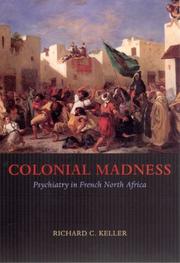| Listing 1 - 2 of 2 |
Sort by
|

ISBN: 9780226429731 0226429733 9780226429724 0226429725 Year: 2007 Publisher: Chicago University of Chicago press
Abstract | Keywords | Export | Availability | Bookmark
 Loading...
Loading...Choose an application
- Reference Manager
- EndNote
- RefWorks (Direct export to RefWorks)
Psychiatry --- Colonialism --- Psychoanalysis --- Colonies --- Psychiatrie --- history --- History. --- Psychological aspects --- Histoire --- Aspect psychologique --- France --- Psychoanalysis and colonialism --- Colonialism and psychoanalysis --- Medicine and psychology --- Mental health --- Psychology, Pathological --- History --- Pʻŭrangsŭ --- Frankrig --- Francja --- Frant︠s︡ii︠a︡ --- Prantsusmaa --- Francia (Republic) --- Tsarfat --- Tsorfat --- Franḳraykh --- Frankreich --- Fa-kuo --- Faguo --- Франция --- French Republic --- République française --- Peurancih --- Frankryk --- Franse Republiek --- Francland --- Frencisc Cynewīse --- فرنسا --- Faransā --- Franza --- Republica Franzesa --- Gallia (Republic) --- Hyãsia --- Phransiya --- Fransa --- Fransa Respublikası --- Franse --- Францыя --- Frantsyi︠a︡ --- Французская Рэспубліка --- Frantsuzskai︠a︡ Rėspublika --- Parancis --- Pransya --- Franis --- Francuska --- Republika Francuska --- Bro-C'hall --- Френска република --- Frenska republika --- França --- República Francesa --- Pransiya --- Republikang Pranses --- Γαλλία --- Gallia --- Γαλλική Δημοκρατία --- Gallikē Dēmokratia --- فرانسه --- Farānsah --- צרפת --- רפובליקה הצרפתית --- Republiḳah ha-Tsarfatit --- פראנקרייך --- 法国 --- 法蘭西共和國 --- Falanxi Gongheguo --- フランス --- Furansu --- フランス共和国 --- Furansu Kyōwakoku --- Francija --- Ranska --- Frankrike --- France (Provisional government, 1944-1946) --- 프랑스 --- Falanxi --- Fa-lan-hsi --- 法蘭西 --- Frankrijk --- Frant︠s︡ --- Франц --- Frant︠s︡ Uls --- Франц Улс --- Psychological aspects.
Book
ISBN: 9780822349792 Year: 2011 Publisher: Durham : London : Duke University Press,
Abstract | Keywords | Export | Availability | Bookmark
 Loading...
Loading...Choose an application
- Reference Manager
- EndNote
- RefWorks (Direct export to RefWorks)
By the 1920s, psychoanalysis was a technology of both the late-colonial state and anti-imperialism. Insights from psychoanalysis shaped European and North American ideas about the colonial world and the character and potential of native cultures. Psychoanalytic discourse, from Freud's description of female sexuality as a "dark continent" to his conceptualization of primitive societies and the origins of civilization, became inextricable from the ideologies underlying European expansionism. But as it was adapted in the colonies and then the postcolonies, psychoanalysis proved surprisingly useful for theorizing anticolonialism and postcolonial trauma. Our understandings of culture, citizenship, and self have a history that is colonial and psychoanalytic, but, until now, this intersection has scarcely been explored, much less examined in comparative perspective. Taking on that project, Unconscious Dominions assembles essays based on research in Australia, Brazil, France, Haiti, and Indonesia, as well as India, North Africa, and West Africa. Even as they reveal the modern psychoanalytic subject as constitutively colonial, they shed new light on how that subject went global: how people around the world came to recognize the hybrid configuration of unconscious, ego, and superego in themselves and others.
Ethnopsychologie --- Colonisation --- Psychiatry, Transcultural --- Ethnopsychology --- Histoire. --- Aspect psychologique --- History.
| Listing 1 - 2 of 2 |
Sort by
|

 Search
Search Feedback
Feedback About UniCat
About UniCat  Help
Help News
News